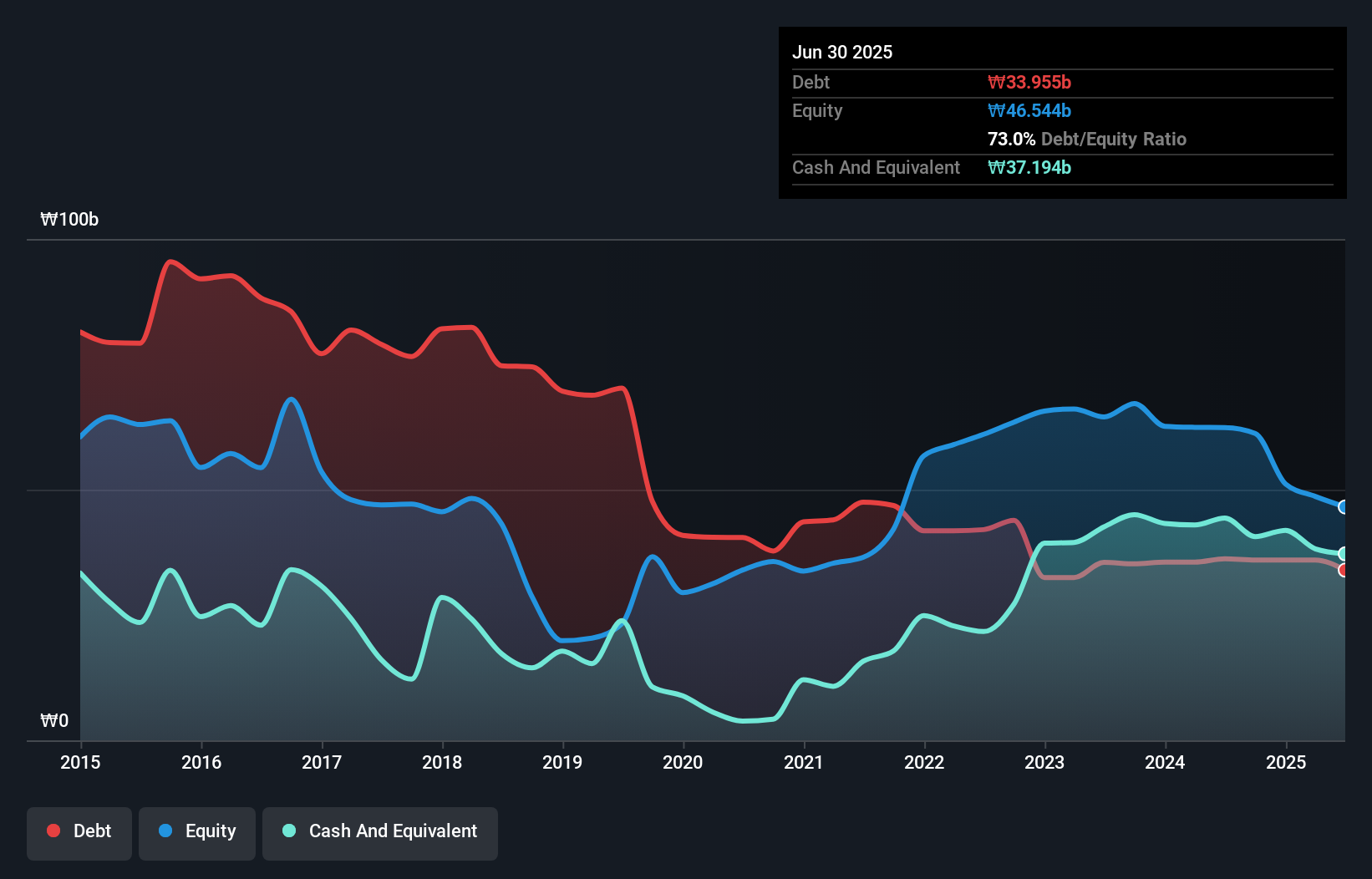The external fund manager backed by Berkshire Hathaway's Charlie Munger, Li Lu, makes no bones about it when he says 'The biggest investment risk is not the volatility of prices, but whether you will suffer a permanent loss of capital.' So it might be obvious that you need to consider debt, when you think about how risky any given stock is, because too much debt can sink a company. We can see that SANGBO Corp. (KOSDAQ:027580) does use debt in its business. But is this debt a concern to shareholders?
What Risk Does Debt Bring?
Generally speaking, debt only becomes a real problem when a company can't easily pay it off, either by raising capital or with its own cash flow. If things get really bad, the lenders can take control of the business. However, a more common (but still painful) scenario is that it has to raise new equity capital at a low price, thus permanently diluting shareholders. Having said that, the most common situation is where a company manages its debt reasonably well - and to its own advantage. The first step when considering a company's debt levels is to consider its cash and debt together.
How Much Debt Does SANGBO Carry?
You can click the graphic below for the historical numbers, but it shows that SANGBO had ₩34.0b of debt in June 2025, down from ₩36.2b, one year before. However, its balance sheet shows it holds ₩37.2b in cash, so it actually has ₩3.24b net cash.

A Look At SANGBO's Liabilities
Zooming in on the latest balance sheet data, we can see that SANGBO had liabilities of ₩46.2b due within 12 months and liabilities of ₩8.88b due beyond that. On the other hand, it had cash of ₩37.2b and ₩20.8b worth of receivables due within a year. So it actually has ₩3.00b more liquid assets than total liabilities.
This short term liquidity is a sign that SANGBO could probably pay off its debt with ease, as its balance sheet is far from stretched. Succinctly put, SANGBO boasts net cash, so it's fair to say it does not have a heavy debt load! The balance sheet is clearly the area to focus on when you are analysing debt. But it is SANGBO's earnings that will influence how the balance sheet holds up in the future. So if you're keen to discover more about its earnings, it might be worth checking out this graph of its long term earnings trend.
See our latest analysis for SANGBO
Over 12 months, SANGBO made a loss at the EBIT level, and saw its revenue drop to ₩52b, which is a fall of 14%. We would much prefer see growth.
So How Risky Is SANGBO?
We have no doubt that loss making companies are, in general, riskier than profitable ones. And in the last year SANGBO had an earnings before interest and tax (EBIT) loss, truth be told. And over the same period it saw negative free cash outflow of ₩5.8b and booked a ₩16b accounting loss. While this does make the company a bit risky, it's important to remember it has net cash of ₩3.24b. That means it could keep spending at its current rate for more than two years. Overall, its balance sheet doesn't seem overly risky, at the moment, but we're always cautious until we see the positive free cash flow. The balance sheet is clearly the area to focus on when you are analysing debt. But ultimately, every company can contain risks that exist outside of the balance sheet. Case in point: We've spotted 2 warning signs for SANGBO you should be aware of, and 1 of them is potentially serious.
If, after all that, you're more interested in a fast growing company with a rock-solid balance sheet, then check out our list of net cash growth stocks without delay.
New: Manage All Your Stock Portfolios in One Place
We've created the ultimate portfolio companion for stock investors, and it's free.
• Connect an unlimited number of Portfolios and see your total in one currency
• Be alerted to new Warning Signs or Risks via email or mobile
• Track the Fair Value of your stocks
Have feedback on this article? Concerned about the content? Get in touch with us directly. Alternatively, email editorial-team (at) simplywallst.com.
This article by Simply Wall St is general in nature. We provide commentary based on historical data and analyst forecasts only using an unbiased methodology and our articles are not intended to be financial advice. It does not constitute a recommendation to buy or sell any stock, and does not take account of your objectives, or your financial situation. We aim to bring you long-term focused analysis driven by fundamental data. Note that our analysis may not factor in the latest price-sensitive company announcements or qualitative material. Simply Wall St has no position in any stocks mentioned.
About KOSDAQ:A027580
SANGBO
Manufactures and sells thin films, and nano coating and materials in South Korea and internationally.
Flawless balance sheet with very low risk.
Market Insights
Community Narratives



